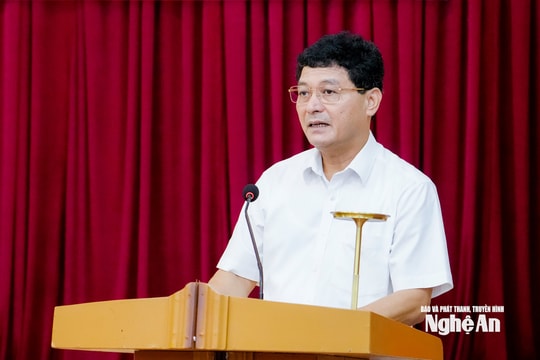The Provincial Party Committee's Organizing Committee guides the implementation of the political standards assessment process.
(Baonghean.vn) - The purpose is to collect information to review, evaluate, and conclude on political standards for cadres and party members sent for training, planning, appointment, and introduction for election to Party committees, to become key cadres, to become National Assembly deputies, People's Council deputies at all levels, and to work in important and confidential agencies, departments, and positions.
Implementing Regulation No. 126-QD/TW, dated February 28, 2018 of the Politburo and Instruction No. 19-HD/BTCTW, dated September 12, 2019 of the Central Organizing Committee, implementing a number of articles in Regulation No. 126-QD/TW, dated February 28, 2018 of the Politburo on a number of issues of protecting internal Party politics, the Organizing Committee of Nghe An Provincial Party Committee has just issued instructions on implementing the political standards assessment process.
 |
| Illustration photo. |
The purpose is to collect information to review, evaluate, and conclude on political standards for cadres and party members sent for training, planning, appointment, and introduction for election to Party committees, to become key cadres, to become National Assembly deputies, People's Council deputies at all levels, and to work in important and confidential agencies, departments, and positions.
It is required to proceed in accordance with principles, carefully, objectively and accurately; when concluding, it is necessary to base on and compare with the regulations of the Central Government.
Subjects: Cadres and party members sent for training, planning, appointment, and introduction to be elected to Party committees, to be key cadres, to be National Assembly deputies, People's Council deputies at all levels, and to work in important and confidential agencies, departments, and positions.
Appraisal content:
1. Workplace assessment:Working with the Party Committee and the head of the agency where the person being assessed is working: Request the Party Committee and the agency to provide the following documents: Personal profile of the person applying to join the Party, personal profile of the Party member (original); Personal profile of the cadre (original); Decisions on promotion; appointment to positions and work transfer, discipline; Related complaints and denunciations (if any); Documents related to the political history and current politics of the individual and family (if any). Request the Party Committee and professional leaders to comment and evaluate the personal profile verification as well as the working process of the cadre (according to form 01).
2. Residence assessment:Working with the Party Cell (block, hamlet, village where the cadre or party member is a permanent resident); the Party Committee or local government where the person being assessed is residing: Request comments and assessments on the Political Standards Assessment Form (according to form No. 02) on the following contents: Compliance with the Party's guidelines and policies, the State's laws and performance of civic duties at the place of residence; implementation of a civilized lifestyle, building a cultured family; relationship with the Party Committee, government and people at the place of residence; do you and your family participate in activities of associations, unions or illegal religious activities? Does anyone have a criminal record or are involved in social evils?
3. Appraisal at hometown:Working with the Party Committee (block, hamlet, village); Party Committee or local government: Request to provide documents related to the political history and current politics of yourself and your family (if any). Request to comment and evaluate the Political Standards Assessment on the political history and current politics of the cadre's family (according to form No. 01).
Cadres whose biological father, mother, brother, sister, or child is a Party member and whose personal history has been fully, clearly, and honestly declared according to regulations do not need to be investigated or verified; any unclear content must be investigated and verified.
If the wife (husband) of a cadre is a party member or has a father, mother, brother, or sister who is a party member and the cadre's personal history has been fully, clearly, and honestly declared according to regulations, then there is no need to investigate or verify the wife (husband); any unclear content must be investigated and verified.
Appraisal process:
1. Receiving and studying documents:Based on the requirements of each type of dossier on sending cadres for training; planning; promotion, appointment; receiving cadres sent by the competent authority requesting appraisal, the appraisal officer studies the dossier, resume and related documents to detect unclear issues; issues related to political standards, determine the content and address, and the person to meet to collect and supplement information and documents for the appraisal work.
2. Collect information and documents:The appraisal officer works directly with the Party Committee and leaders of the agency related to the cadres who need appraisal, requesting the provision of information and documents related to the political standards of that cadre or party member.
Documents include: CVs of party members, cadres, and civil servants (original). Annual reviews, comments, and classifications of cadres and party members; Annual comments and assessments by the Party Committee and authorities where the cadres and party members reside. Decisions on promotion, appointment to positions, and transfers; Letters of reflection, denunciation, accusation, complaint, press information reflecting or related to cadres and party members (if any).
It is necessary to pay attention to collecting more information, sources, public opinion, and feedback from the people, but must be carefully screened and considered, not subjective or one-sided.
3. Analyze and evaluate the audit content:Based on the records, documents and collected information, compare, review, research, analyze and propose conclusions.
In case there is sufficient basis to determine that a cadre or party member does not meet the political standards for promotion or appointment, the appraisal officer shall report to the competent leader and draft a response to the agency requesting the appraisal, clearly stating the reasons for not agreeing to the promotion, appointment or job assignment.
In case there are unclear issues or insufficient grounds to determine whether a cadre or party member meets or does not meet the political standards for promotion or appointment, a written report must be made to the competent Party Committee to decide on the investigation and verification; at the same time, a written notification must be sent to the agency requesting the investigation for coordination in resolving the matter.
4. Review the appraisal results and advise on conclusions: TBased on the results of the assessment at the hometown; place of residence; place of work and work with relevant agencies, organizations and individuals; collected documents and evidence; summarize the assessment results, clearly state the political issues of the assessed cadre, clearly affirm whether there is any violation of Regulation No. 126-QD/TW or not?
In case of ensuring political standards for receiving, promoting, appointing, planning, or electing to the Party Committee, the staff shall submit to the competent authority a conclusion on political standards.
In case the assessment does not meet the political standards according to current regulations, the response document must also clearly state "Not meeting the political standards according to regulations for receiving, promoting, appointing, planning, or electing to the Party Committee.
In case there are many complicated issues, after appraisal there is not enough basis for conclusion, report to the competent Party Committee to request direction for investigation and verification, and at the same time notify in writing the agency or unit requesting appraisal for coordination.
5. Prepare a profile for political standard assessment according to regulations:Collect relevant documents, prepare records and transfer to the archive department as prescribed.
During the implementation process, if there are any difficulties or problems, the units are requested to report to the Provincial Party Committee's Organizing Committee (through the Internal Political Protection Department) for specific instructions.

.jpg)
.jpg)






